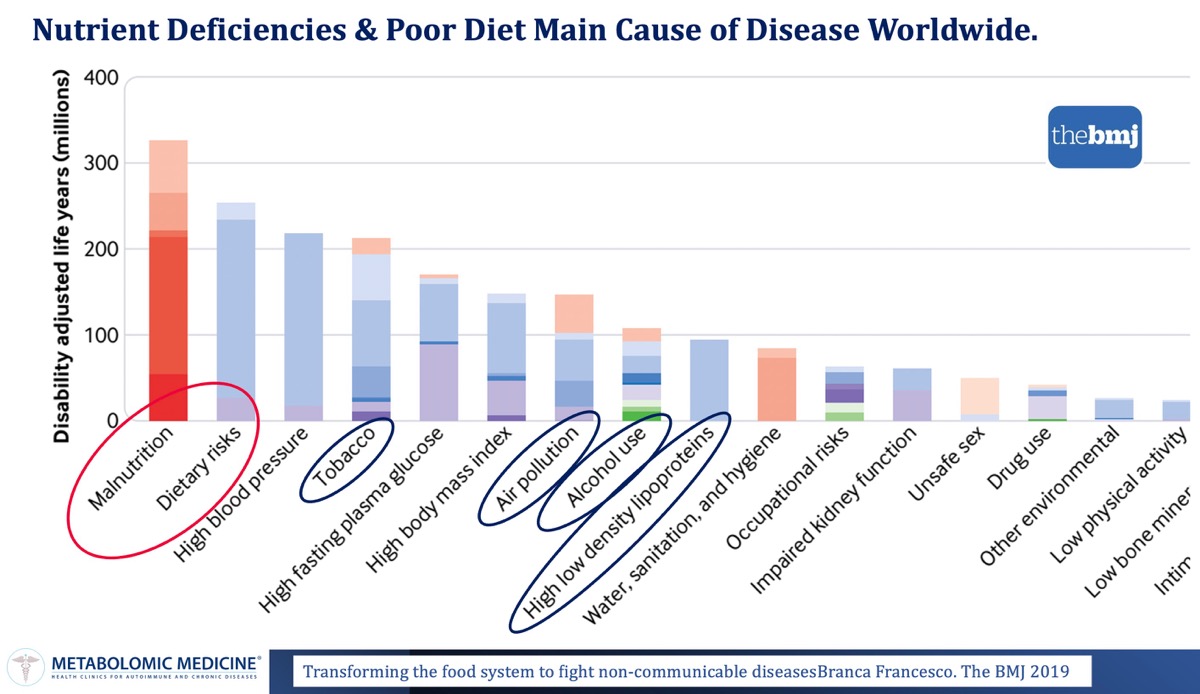
Your Body is Designed to Be Healthy
Unlock Your Body's Potential by Addressing Nutritional Deficiencies and Metabolic Factors That Hinder Your Health
Did you know that your body is inherently designed to be healthy? It's true!
Your genes carry a blueprint for optimal health; you can unlock your body's full potential with proper care and attention.
Micronutrient deficiencies and metabolic disorders that are hard to detect often go unnoticed for years and hinder your body's ability to achieve optimal health.
The human body needs 160 elements in precise proportions to function at its best. These elements are essential in ensuring your body is healthy and in optimal condition; they are:
- Oxygen
- Water
- Macronutrients (proteins, fat and carbohydrates)
- Vitamins
- Minerals
- Trace minerals
- Amino acids
- Fatty acids
- Antioxidants
- Probiotics
- Phytonutrients
- Digestive enzymes
All the above must be available simultaneously in sufficient quantities to ensure health.
In the past, nutritional deficiencies were evident and resulted in diseases like beriberi (caused by vitamin B1 deficiency), scurvy (caused by vitamin C deficiency), and many others. Nowadays, the most common deficiency type is related to marginal deficiencies of multiple essential nutrients.
This type of multiple marginal deficiencies is termed "Hidden Hunger."
Based on our clinical experience and current research, we have found that hidden hunger and metabolic dysfunctions caused by poor dietary choices and an unhealthy lifestyle are two of the most pressing issues affecting human health today.

Image: Malnutrition and Diet are the primary factors driving disease worldwide.
It is so simple that sometimes it is tricky to observe. When the body lacks the essential elements for its function, and when the metabolic conditions are not met, it just cannot function; it is that simple. Missing that point, we then try to find a "cause" for the disease and a "pill" that will cure it.
It's true that various factors, such as genetic predisposition, infections, mental stress, lack of sleep, exposure to radiation and toxic substances, environmental pollution, etc., can lead to diseases. However, neglecting the known fact that over 80% of chronic illnesses are caused by malnutrition, poor diet, and lifestyle choices can make it almost impossible to achieve good health.
It is encouraging, though, that these factors can be modified, making it possible to achieve better health.
Hidden hunger, a form of malnutrition, is characterized by a lack of essential micronutrients such as vitamins and minerals. It is often overlooked and can lead to serious health consequences such as a weakened immune system, impaired cognitive function, endocrine dysfunction, autoimmune diseases, cancer, impaired body's ability to repair its tissues, and premature death.
Metabolic dysfunctions, such as insulin resistance, dysbiosis, mitochondrial dysfunction, and chronic inflammation, on the other hand, can result from consuming an imbalanced diet that is high in sugars, oxidized fats, and processed foods, providing high calories with low nutritional value.
These dysfunctions can lead to a range of chronic conditions, such as obesity, diabetes, heart disease, autoimmune diseases, and cancer, and increase the rate of aging.
Detecting and addressing these issues is crucial for improving health outcomes and reducing the burden of chronic diseases.
The challenge in improving health lies in ensuring the availability of all necessary nutrients simultaneously, in sufficient quantities, and for an adequate duration.
Even if nutrients are provided simultaneously and in sufficient amounts, it takes around 2.5 years for the organism to reach an optimal metabolic condition, despite the immediate improvements and repairs that start to occur.
Most people observe changes within the first 6-8 months and experience significantly improved and stable health within the first year. When the optimal metabolic condition is reached, it is easy to maintain and improve health with minor interventions.
Hidden Hunger is extremely difficult to diagnose with conventional measurement methods.
Only a few years ago, accurately identifying individual deficiencies with traditional measurement methods was challenging. Thus, corrections were based on general guidelines with limited efficacy.
Specialized tests are now available to accurately identify deficiencies and metabolic disorders by measuring small molecules involved in the body's chemical reactions. This type of analysis is called Metabolomic Analysis.
Our scientific team has clinical experience and data gathered from more than 60,000 analyses before and after implementing nutritional, pharmacological, and lifestyle interventions.
The insights and knowledge obtained result from a rigorous and comprehensive clinical and research process aimed at providing the patient with a deeper understanding of the impact of these interventions on health and well-being.
Our scientific team has followed more than 25,000 patients who sought our help for:
-
Autoimmune diseases such as Hashimoto's thyroiditis, rheumatoid arthritis, psoriasis, lupus, multiple sclerosis, ulcerative colitis, Crohn's disease, and Sjogren's syndrome and others. These diseases occur when the immune system attacks the body's own tissues and organs, leading to chronic inflammation.
-
Chronic metabolic conditions such as diabetes, metabolic syndrome, insulin resistance, obesity, hypertension, hypertriglyceridemia, hypothyroidism, hyperthyroidism, and high cholesterol levels.
- Chronic diseases such as cardiovascular diseases, chronic inflammatory conditions, osteoarthritis, irritable bowel syndrome, gastrointestinal problems, GERD, low energy levels, atopic dermatitis, and migraine headaches.
Many clients seek our services for preventive care and to enhance their overall health span and longevity.
Our team has a wealth of clinical experience and has conducted extensive research.
We are proud to have published over 60 peer-reviewed papers on various topics, including autoimmune diseases, metabolomics, longevity, and interventions based on correcting micronutrient deficiencies and metabolic dysfunction in chronic diseases.
Over 90% of our patients experience improvement, transitioning from gradual deterioration to constant improvement.

/new%20patient%20start.png)